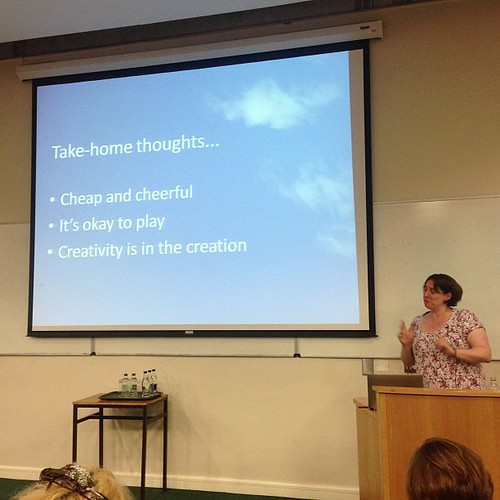Last week I popped over to Dublin for the Irish Symposium on Games Based Learning at the Dublin Institute of technology. It is a few years since I was there last at Metameets listening and talking virtual worlds.
There is a very influential core of virtual world people there and many of them were at the conference so that is alway good to have a real world/SL meetup.
Dr Pauline Rooney from DIT opened up the conference and it felt like I was in the right place.
The opening keynote was by Dr Nicola Whitton from Manchester Metropoliton University. “Game Based Learning in an Age of Austerity”. I then knew I was in the right place because everything Dr Whitton said resonated with some many projects. The key theme was that you don’t have to spend millions of pounds making games for learning, they also don’t all have to be technical deliveries of games. Making a game out of making a game can be as beneficial as putting people through the end product.
She showed an example of the sort of thing that happens in medical sims and games. Lots of huge expensive graphics and realism with a text multiple choice question on the top. Having had to build some things like that, to meet requirements, but having also subverted that with simpler ideas and gaming concepts I was sat there nodding in agreement.

The other point as you can see in the take home points above was that it is ok to play. Humans learn through play and it still gets regarded as not serious enough. Tales of people expecting to put away childish things and then how restrictive their thinking gets when faced with exploring and creating in a playful way.
After a quick coffee I chose to stay in the same room for the next track.
Neil Peirce from Learnovate Centre Trinity College Dublin presented his academic paper “Game Based Learning for Early Childhood“. I did not get so much form this, though I am sure the research was very as really I needed to read the paper. However, this was an academic conference and I am not technically an academic so it was not aimed at me 🙂
I was more interested in “An investigation into utilising a Theraputic Exergame to improve the Rehabilitation Process” where the Waterford Institute of Technology had worked with physiotherapist and used a Kinect, Unity and Zigfu to explore repetition of exercise in the home. This appeared successful, and fitted well with my experience of kinect and how we can broadcast and work together physically using these devices.
Next up was a great Prezi presentation by S. Cogan from the National College of Ireland. He was explaining “engagement through ramification”. Whilst the word gamification is now tired and over used he presented it from a point of view of not knowing what it was, how he was going to use it and shared waht worked and didn’t work in getting the student he lectured to be bothered about class. The positive results were that he had got much better attendance and pass marks, but also that he himself felt a greater sense of achievement making some of the activities more game like. It was very inspirational to hear a younger lecturer looking to change things around a bit, but not completely overturn the system. It all just made sense, and sharing what failed (wrong rewards, too much game in some things etc.) was very refreshing.
After lunch it was 2 hour workshop time so I popped along to “Developing games for Learning using Kinect”. Now I was not sure what to expect, I thought I might be able to help out as well as have a bit of fun myself. I had not fully realized that it was Stephen Howell who is the creator of the very cool Kinect for Scratch. It was great to hear @saorog explain scratch to the audience of mostly non techy people and get them programming in the same way its done with kids, then hit everyone with the simplicity of using the kinect in scratch. It was very well done and very well delivered, he is a clever bloke 🙂 . He also showed us his Leap motion controller in action 🙂
After a bit of Irish culture on the evening.

Followed by almost no sleep as my hotel room had no double glazing so the ongoing partying in Camden Street and the subsequent bottle deliveries pretty much filled all the early morning….
Elfeay and I did out little pitch. “I am a Gamer. Not because I don’t have a life, but because I choose to have many”. We each did a 8 minute chat on how we have found our various tribes, how games and games technology and culture have led us to places that then feed into more games and games culture. My example being the journey in Choi Kwang Do via games and tech, plus a few other things thrown in 🙂 It provoked some good workshop style discussion too. It was also great fun to do in that format and huge thanks to Elfeay for getting it all on the roster 🙂
It also dovetailed nicely into some Pecha Kucha sessions where slides are timed and there are a given number in a given time slot. It is almost the presentation equivalent of a vine or a tweet. Concise, well planned to fit and delivers a lot in a small package.
Dudley Turner from University of Akron in the states did a great piece of “developing a quest-based game for university student services”. Making the discovery of what is available to new students on campus through a mix of alternate reality pieces of information like emails and mini websites linking a narrative to real world tresure hunting using Aurasma AR location specific tags to get them to places. It is all part of a course that they have to take anyway, but this gets them out and about and engaged with the places they need to be at, not just reading and looking at maps.
The next was P.Locker presenting “The snakes and ladders of playing at design:Reflections of a museum interactive designer, game inventor and exhibition design educator”. This was refreshing as it was not really about the tech end of things, but the core of play and interaction. Physical installations and how being a board game designer helped create museum pieces and teach others how to make them. There are elements of practicality and robustness in the physical aspects to consider as well as the learning aspects.
Finally, last but by no means least, S. Comley the University of Falmouth talked about “Games based learning in the Creative Arts”. It was surprising to hear that arts were not heavily involved in the use of games in the learning process. It seems human nature to stick with what you know hits everywhere. It will be interesting to see where her research takes her, as this was a precursor to a much bigger piece of work, stating the problem and the potential benefits. In particular to get cross discipline interaction in academic arts.
That was it for the main tracks. I missed a lot as lots was on at the same time but it was all brilliant.
It ended with a keynote from Fiachra O Comhrai from Gordon Games. “Using game science to engage employees and customers in the learning, knowledge sharing and innovation process”. What was interesting here was that Gordon Games was formed by non gamers. Mr Comhrai said he formed the company then decide to look at some games. I felt slightly uneasy at that, but good on them for doing it anyway. As a long time gamer where I both play and analyze what is going on it felt that my 40 years of gaming experiences was being summed up as something that you pick up in weekend on xbox. I am not sure that is what he meant. Also much of their work is in call centres, though we did not get to see many examples of Gordon Games, we did get to see some fun videos from other people.
After that some of us Second Lifers headed off for lunch before I dived into a taxi and headed home.
Here we all are looking very shifty 🙂
@elfeay @acuppatae @inishy @d_dreamscape @iClaudiad
So thankyou Dublin and thankyou everyone at the conference it was a blast and very inspiring to be with so many clever and passionate people.
